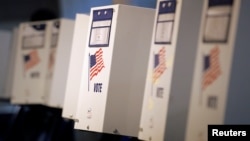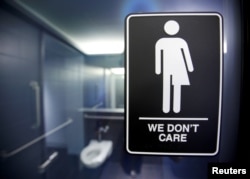Up to 34,000 transgender people in the United States could face problems voting in next month's election because their ID cards do not match their gender, advocacy groups said, urging them to vote by mail to avoid being turned away at the polls.
Transgender rights have come under increasing scrutiny in the United States with access to public bathrooms and health care dominating media coverage and political discourse in recent months.
Thousands of transgender people, however, might be unable to vote in the November 8 presidential election in states with stringent voter ID laws, according to a report by the Williams Institute at the University of California, Los Angeles.
“A transgender voter may show up at the poll with a valid ID, however if they have not been able to update the gender marker or photo on that ID, a poll worker may be confused and refuse them a ballot,” said Arli Christian, spokeswoman for the National Center for Transgender Equality (NCTE).
Doubts about gender on an ID is not a valid reason to deny a ballot, but it has been used to turn transgender voters away from polling stations in the past, campaigners said.
“It’s a shame that a trans person would have to put themselves at risk of scrutiny, harassment, discrimination to exercise something as basic as their right to vote,” Christian said.
Thirty-four states have passed voter identification laws, according to the Williams Institute, with eight requiring the voter show a government ID with photo.
In a 2011 survey by the National Center for Transgender Equality and the National Gay and Lesbian Task Force, 40 percent of transgender respondents said they were harassed when they presented an ID that did not match their gender identity.
Though a civil rights issue, the problem voter ID laws represent for transgender people have yet to generate the kind of debate raised by other LGBT issues, said Kenneth Sherrill, a political science professor emeritus at Hunter College in New York City.
The transgender vote represents a small fraction of the U.S. electorate and does not have the potential to significantly alter the election's outcome, he said.
Jillian Weiss, head of the New York City-based Transgender Legal Defense & Education Fund, said absentee voting is good advice but “shouldn't have to be necessary.”
“Let’s not forget that this is a workaround for the equal protection of the laws that people are otherwise entitled to,” said Weiss, whose organization is looking for cases of transgender people being denied the right to vote.
On November 8, American voters will pick a new president as well as elect members of the U.S. Congress.






